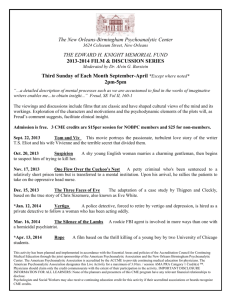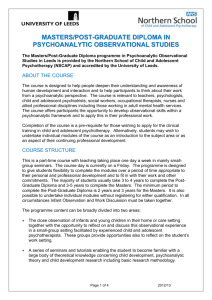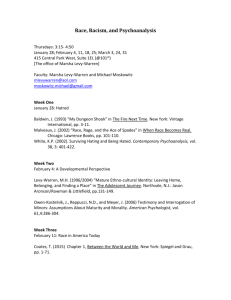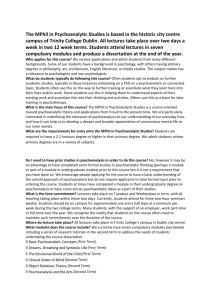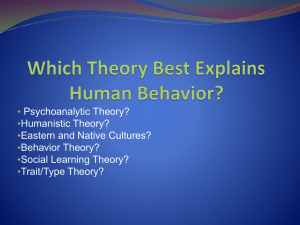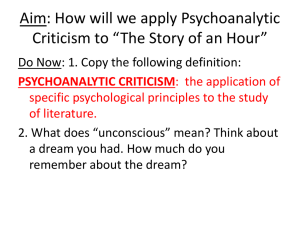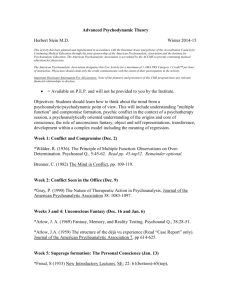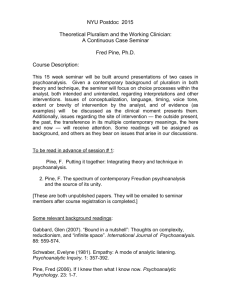Psychoanalytic Infant Observational Studies (M7)
advertisement
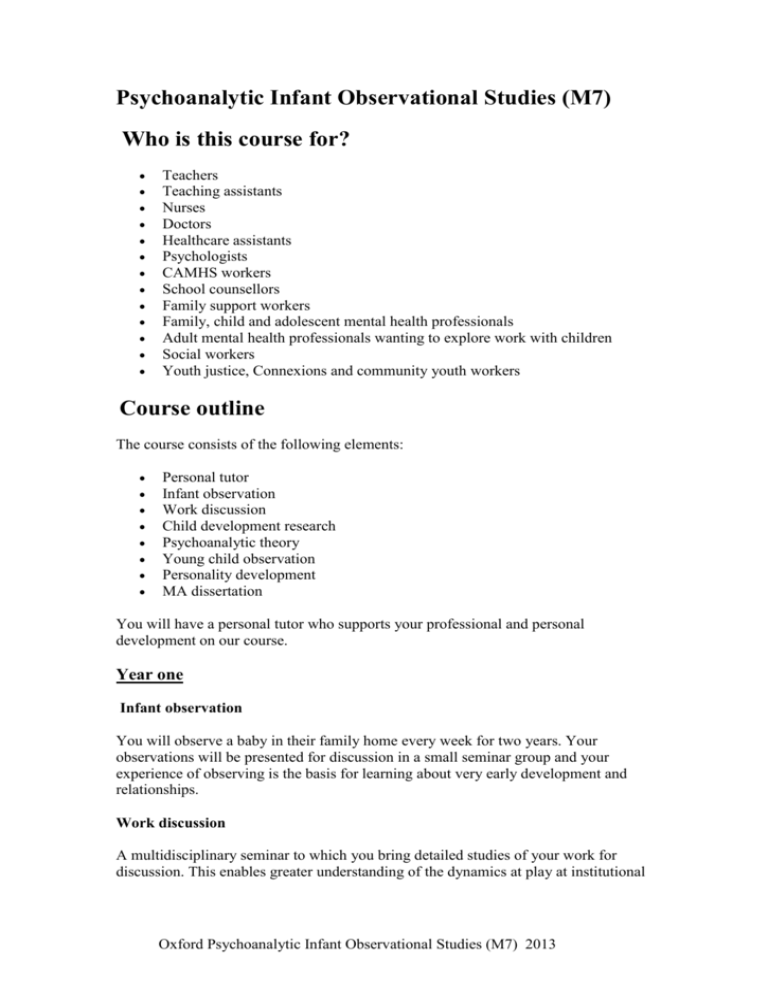
Psychoanalytic Infant Observational Studies (M7) Who is this course for? Teachers Teaching assistants Nurses Doctors Healthcare assistants Psychologists CAMHS workers School counsellors Family support workers Family, child and adolescent mental health professionals Adult mental health professionals wanting to explore work with children Social workers Youth justice, Connexions and community youth workers Course outline The course consists of the following elements: Personal tutor Infant observation Work discussion Child development research Psychoanalytic theory Young child observation Personality development MA dissertation You will have a personal tutor who supports your professional and personal development on our course. Year one Infant observation You will observe a baby in their family home every week for two years. Your observations will be presented for discussion in a small seminar group and your experience of observing is the basis for learning about very early development and relationships. Work discussion A multidisciplinary seminar to which you bring detailed studies of your work for discussion. This enables greater understanding of the dynamics at play at institutional Oxford Psychoanalytic Infant Observational Studies (M7) 2013 and interpersonal levels and the possible emotional meaning of communications. Psychoanalytic theory one Theory is presented as a way of organising and describing observation and experience. You will read key papers by Freud and others, and discuss the development of ideas in a fortnightly seminar. Child development research You will attend fortnightly lectures, with related reading, covering recent and seminal research in the field of child development. Year two Infant observation and work discussion weekly seminars continue. Young child observation You will observe a pre-school child in their family or in a nursery setting for an hour a week for an academic year, learning about the emotional meaning of the child’s behaviour as s/he starts to relate to others outside the family. Theory two You will focus on the work of Melanie Klein. In term 3, the thinking of Winnicott is introduced. Personality development The seminar offers you a psychoanalytic approach to exploring ideas about the development of the personality through the lifecycle. Year three MA dissertation Individual supervisions and seminars will help you develop and research your ideas and write the dissertation. Academic award and professional accreditation Upon successful completion of this course you will be awarded an MA or post graduate diploma, accredited by the University of East London. Oxford Psychoanalytic Infant Observational Studies (M7) 2013 Why study with us? This course will: Develop your skills in baby and child observation and in applying observation in your work setting. Develop your understanding of human development informed by a psychoanalytic approach and child development research. Provide you with a wider frame of reference for thinking about current work. Enhance your capacity to make decisions about career development. This course (or its equivalent) is a prerequisite for training as a child psychotherapist on the Professional Doctorate in Child Psychoanalytic Psychotherapy course. Assessment For the post graduate diploma you will be required to attend a seminar series over the course of two years and to submit written assignments. If you successfully complete all of these assignments and would like to progress to the Masters award, you will go on to complete a dissertation under supervision. Attendance The 5 seminar groups are taught by Child and Adolescent Psychotherapists, are 1-1.5 hrs long and held in the evenings, weekly or fortnightly, at various venues in Oxford. Duration Postgraduate Diploma: 2 years, MA: 3 years. It is possible for the course can be taken as a part time option over a longer period of time. Entry requirements Selection is based on an aptitude for learning about emotional development, observation and psychoanalytic thinking; this is demonstrated through the application form, and interview. You are required: To have had at least one years’ experience of direct work, paid or voluntary, with children, young people, parents or families; To be currently undertaking direct work with children, young people, parents or families (minimum one to two days a week); To have a first degree, or the equivalent, or to be able to demonstrate that you will be able to meet the academic demands of the course; To provide two references, one from an employer who can give an account of your work with children. Oxford Psychoanalytic Infant Observational Studies (M7) 2013 Start date September 2013 To apply Application is through the Tavistock Clinic (observation2admin@tavi-port.ac.uk), or the organiser of the M7 Oxford training, Consultant Child and Adolescent Psychotherapist, Ellie Roberts at ellieroberts@mac.com 07711513766. Final date for application is 31 June 2013 What students say about the course "I did not expect to enjoy this course as much as I have. Working with children and families for the past few years, I wanted to gain further qualification and extend my knowledge. This course delivered beyond this, a space to explore the questions you ask yourself in work and life, which you do not have the time to apprehend. On a weekly basis I am invigorated to return to cases with renewed insight, ideas and enthusiasm. You then begin to link and connect all experiences of life to bring to your studies and work, creating a hugely organic and holistic experience. This course is a pleasure for anyone looking to gain further understanding of child development and psychoanalytic theory. Moreover, it develops a comprehensive and creative professional." Anthony Ogoe, M7 First Year Student November 2012 "Doing M7 has given me new lenses through which to view everyday experiences. It has shifted the axis of my personal and professional life. Nothing is seen or heard in quite the same way as before. Certainty is displaced. Questions abound. M7 has helped me face things I'd rather ignore, develop greater resilience and contain difficult emotions. Observation of development from birth onwards has reconnected me to a sense of awe and wonder about this experience we call life and changed my outlook in ways I could never have imagined." Sonia Aboage, M7 Student November 2012 "M7 has paved the way to my developing capacity to understand complex, and often unconscious, emotional factors that are in operation in the work setting. These include relationships between workers and clients as well as group and institutional dynamics. This programme has enhanced my ability to contribute sensitively not only to my clients’ thinking but also to my colleagues’ and other professionals’ work material. The personal tutor relationship, along with other student support resources, has been instrumental in tackling difficulties and developing strengths on the course." Nikos Serras, M7 Student November 2012 Oxford Psychoanalytic Infant Observational Studies (M7) 2013 Oxford Psychoanalytic Infant Observational Studies (M7) 2013
